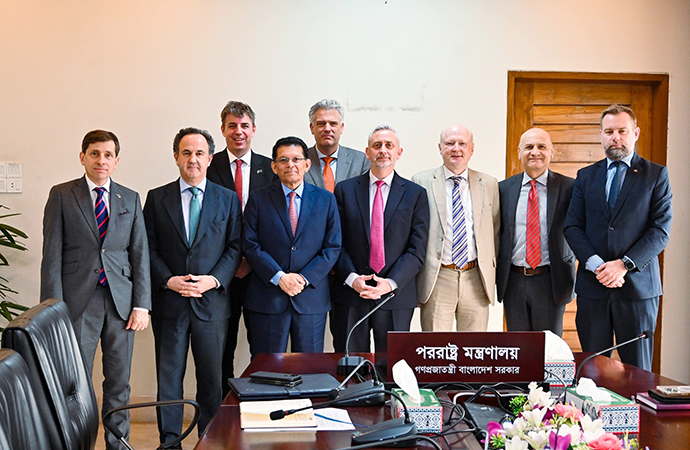Essays

Jim Caviezel as Tim Ballard in Sound of Freedom | Angel Studios
Glorifying vigilante justice may sell movie tickets, but it doesn’t help trafficked children
Sound of Freedom, released last month, is the latest Hollywood film claiming to provide a window into the world of human trafficking. It's based on the alleged real-life activities of Tim Ballard, a retired US Customs and Border Protection agent and the founder of Operation Underground Railroad. OUR is a US-based anti-trafficking NGO famous (or notorious) for its vigilante-style rescue attempts and history of false claims.
For those who have not or will not see it, the story revolves around Ballard's quest to rescue a young girl from her traffickers - a plight he learned about from her younger brother, whom he coincidentally rescued from a paedophile. The twisting, adrenaline-packed path to success that comes next isn't that dissimilar to Taken, the (completely fictional) anti-trafficking action classic from 2008 starring Liam Neeson.
After learning of the girl, Ballard lies his way into Colombia, where he stages an elaborate rescue mission involving a fake sex hotel. When the young girl is not among those rescued, he boldly travels into the jungle to find a criminal so dangerous that even the military refuses to touch him. After gaining entrance by posing as a doctor, Ballard kills a trafficker, rescues the girl, and leaves a bunch of other victims behind as he makes his escape.
As professionals with over 15 years of experience each, we feel compelled to add our voices to the chorus calling this film out. Sound of Freedom's sensational depiction of trafficking, dehumanisation of survivors, and rock 'n roll attitude to their rescue is as seductive as it is misleading for movie goers. It gives them false information while inspiring them to join the fight against trafficking. And that combination is extremely harmful to the real work of supporting survivors that we do.
Just enough truth to hide the harm
Credit where credit is due: the film shows how hard these cases can sometimes be, and how difficult it is to not want to do everything possible to help victims. This serves mainly as a vehicle to valorise Ballard in the film, but it's there nonetheless. Likewise, promises of opportunities such as a modelling gig that turn into exploitation are a fair portrayal of how trafficking can happen.
Aside from this, any foundation in the real world is quickly discarded in favour of roughly two hours of predictable tropes and sensationalism. The film opens with a montage of small children being snatched off the street and ends with a lone girl in a white dress, playing a drum (ostensibly to the beat of the sound of freedom). In between we get victims marked with tattoos by traffickers, brave white men sacrificing their careers to save black and brown children from black and brown perpetrators, and infantilised victims. Like most action movies, it's a celebration of the hero figure - the lone individual who goes outside the bounds of the law and procedure to make up for the failings of governments that refuse to do what is necessary.
Reactions have been mixed. The intended audience obviously loves it: Rotten Tomatoes shows a 99% audience score, versus a 72% rating from critics. It's a box office success. However, it's heartening to see scepticism being aired alongside the fawning. Vice noted OUR's troubled past in its review; Slate ran with the headline 'How Jim Caviezel's child-trafficking film misrepresents its subject'; and Rolling Stone published a piece explaining Why Anti-Trafficking Experts Are Torching 'Sound of Freedom'.
We need these voices of reason, because this film's attempt to raise awareness is not just reckless. It's downright dangerous.
The seduction of a simple win
There is nothing inherently problematic about using film to raise awareness of trafficking. What is harmful, though, is likening anti-trafficking work to an adventure, suggesting that Ballard's methods are the right way of doing things. They most assuredly aren't, but moviegoers will struggle to see that. In the age of QAnon, Sound of Freedom is just as likely to create believers in vigilante justice as it is supporters of the anti-trafficking cause.
In between the fawning and the criticism, the general public seems uncertain with how they feel about this film. We've seen a mix of generosity, defensiveness and hope as they struggle to parse fantasy from reality. Those arguing that scenarios like this do happen are correct, to a certain extent. Are children abducted and trafficked? Yes. Is that the norm? No. Does it take a single determined person to courageously fight back and rescue them? Absolutely not. Can you heal from the trauma of trafficking? Yes. Does it happen instantaneously? 100% NO.
One of the most common reactions asks whether, despite the sensationalism, Sound of Freedom is doing something inherently good because it's spreading awareness. The answer to that is unequivocally no, but we recognise that it can be hard for the general public to discern exactly why that is the case. So let us explain.
From a professional standpoint, the harm stems from the way the film distorts what responding to and healing from trafficking looks like. Much of this will likely go unnoticed by the public, because the mistakes are found in the small, procedural details that improve the viewing experience but would be considered worst practices in the office.
For example, in any responsible scenario, Ballard would have immediately referred the girl's brother to the Department of Health and Human Services after rescuing him from the paedophile. Instead, he accompanied him to the hospital, and then took him - alone! - to a burger joint. There he defies all logic and training by asking the boy to share details about his experience in a crowded restaurant. Who does that? And who on earth allowed him to do it?
Professionals are the opposite of lone heroes. Multidisciplinary teams are considered best practice in a response, and are in fact critical to ensuring survivors receive wrap-around support. According to Sound of Freedom though, all you really need is a man with a gun and a boss willing to provide cover for a few months. All you need is an individual with the courage to believe that the rules need not apply, and that the ends justify the means.
But rules are there for a reason. There are extensive protocols and procedures in place for situations involving minors, and while they might not be perfect and can often be frustrating, they keep victims safe and mitigate further trauma. Breaking them is how people get hurt.
Unrealistic expectations
Perhaps most egregious is the way the film portrays the actions and attitudes of the survivors. The film would have audiences believe that moving forward from trafficking is easy. Intervention by a well-meaning individual cures survivors of trauma and harm, while also eliciting joy, appreciation and immediate trust. Whether singing together on a beach, or sitting on a bed in a white dress playing a drum, the implication is clear: these survivors have been rescued in the fullest sense of the word. They are safe. They are free. Life is a blank slate and they are eager to start again.
This is a dangerous message to put into the world. Healing takes years, sometimes decades. Suggesting otherwise is to perpetuate a myth that causes real harm to survivors.
In a world where quick rescues are believed possible, policymakers are less likely to provide the resources necessary to investigate cases and support survivors. Communities are less likely to fund trauma-informed, wrap-around support. Root causes are harder to see and more difficult to treat. Survivors with complicated experiences get lost. Concerned citizens put themselves and others in danger by playing at rescue. And juries fail to hold offenders to account because their case isn't like what they've seen on tv. These are the dangers of unrealistic expectations, and they make this work - which is already hard - all the harder.
What, exactly, is Sound of Freedom hoping to achieve? The birth of a new wave of saviours shoving their way through red tape, going toe to toe with traffickers? Heroes who end their stories with hugs and smiles from victims? An army of vigilantes shooting their way to justice?
All we can hope is that copycat Ballards fail to materialise. Anti-trafficking work - real anti-trafficking work - is the opposite of glamourous. It's endless hours writing grants, or on the phone with understaffed charities trying to find safe shelter. It's trying to reason with local communities when they rally against building a human trafficking shelter in their neighbourhood because it will impact property values. It's fighting bureaucracies to keep support in place for as long as it takes for survivors to heal.
Ultimately this film does quite the opposite of spreading awareness. Sound of Freedom is a convenient dodge. It sidesteps any mention of the real underlying problems by focusing attention on individual responsibility and individual saviours. It situates trafficking in a specialised and elite area, where only mythical heroes stand a chance. It divorces the public from their role in creating an environment where trafficking can thrive, and absolves them from thinking about what support actually looks like. It perpetuates the lie that girls will sing and celebrate the moment they are rescued. Nobody need think about housing, mental health, education, or job skills. No one needs to think about the hard parts.
From openDemocracy

























Leave a Comment
Recent Posts
Bangladesh’s first drought-res ...
In a groundbreaking development for Bangladesh’s agriculture, Ga ...
US and Iran hold another round ...
Iran and the United States were holding another round of indirect talk ...
An early hiccup for the new government?
Japan invites PM Tarique, eyes cooperation with Bang ..
Bangladesh to achieve sustained growth, prosperity u ..
Dhaka indicates ‘forward looking, balanced partnersh ..